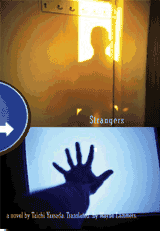Strangers
Taichi Yamada
Vertical-Inc
US Hardcover First
ISBN 1-932-23442-X
Publication Date: 10-01-2003
208 Pages; $19.95
Date Reviewed: 08-08-03
Reviewed by: Rick Kleffel © 2003

REFERENCES
COLUMNS
|
|
|
StrangersTaichi YamadaVertical-IncUS Hardcover FirstISBN 1-932-23442-XPublication Date: 10-01-2003208 Pages; $19.95Date Reviewed: 08-08-03Reviewed by: Rick Kleffel © 2003 |
|
|
REFERENCES |
COLUMNS |
Horror works best if the reader can be tied to an emotional state other than horror in addition to horror itself. The contrast and interplay between horror and emotional states other than horror lends more power and credence to the feeling of fear. Taichi Yamada's 'Strangers' moves carefully through a series of emotional states before it comes to visit fear itself. The dislocation of the disenfranchised urban citizen is carefully dissolved into something considerably more comfortable and yet more alien. Readers looking for an entirely different, yet very accessible take on apparitions should make sure to accompany Yamada on his journey into the center of the city. Moreover, filmgoers who enjoyed 'Ringu' will find a very familiar feel in this novel. Quick, slick and filled with nice wordsmithing by the writer and the translator, 'Strangers' brings cloying emotions into the world of terrorizing fiction.
Harada is a divorced TV scriptwriter living in a huge Tokyo apartment. Filled with businesses during the day, he begins to suspect that he is alone in the building at night. Betrayed by his business partner, his loneliness grows until he decides to take a sentimental journey back to his childhood haunts. Both his parents were killed in a tragic automobile accident, but he was raised well by grandparents and uncles. While wandering about in the changed landscape, he meets a likeable man in a comedy club who bears an astonishing resemblance to his father. On a whim, he accompanies the man to his home where a dead-ringer for his mother waits. The visit is strangely empowering.
Yamada combines some interesting emotions in this novel to create an atmosphere of cloying terror. Meeting versions of your parents who are actually younger than you is a distressing idea, and the author plays this to a perfect pitch. As events progress the unreality peels away the happiness-only exterior and reveals a layer of rot underneath the joy. Yamada's skill at swinging between the real and the unreal is reminiscent of the old Rod Serling Twilight zone scripts. The tension is expertly built while the feelings are kept in true.
Prose can be a problem in translations, but it's not one in 'Strangers'. In fact, Yamada as translated by Wayne Lammers comes up with some stinging great stuff:
"What did it amount to, anyway -- this life I led? Busying myself with random events that popped up one after another, enjoying the moments of excitement each little stir brought before it receded into the distance, yet accumulating no lasting store of wisdom from any of it. Each new day went by in much the same way. I never attained maturity, while I found myself growing feeble with age."
Yamada touches on the same nerves that Dennis Etchison plays with, the same sense of urban dislocation and despair. He makes ample use of cloying happiness as well, pouring so much sugar into the mix that the sweetness becomes a source of fear. For my tastes, the genuine sentiments don't get trod deeply enough into the ground, but it's clear that Yamada is achieving exactly the effect he wishes to achieve.
Readers of 'Strangers' will be hard pressed not play out the novel as a movie, and if someone doesn't snap this up and produce it, well, then they're as stupid as we all think they are. Whoever they are. 'Strangers' is a tightly written and taut novel, the kind you'll grip between sweating hands as you finish it off in a day or so. Yamada pulls the plot in unexpected directions and gives you a truly Japanese-ghost story feel. There's enough culture in common to make 'Strangers' something the reader can identify with and yet just enough alienation to make it feel new and different. Readers who want to highlight their horror with the alien colors of different culture will find much to admire in this concise and frightening novel.